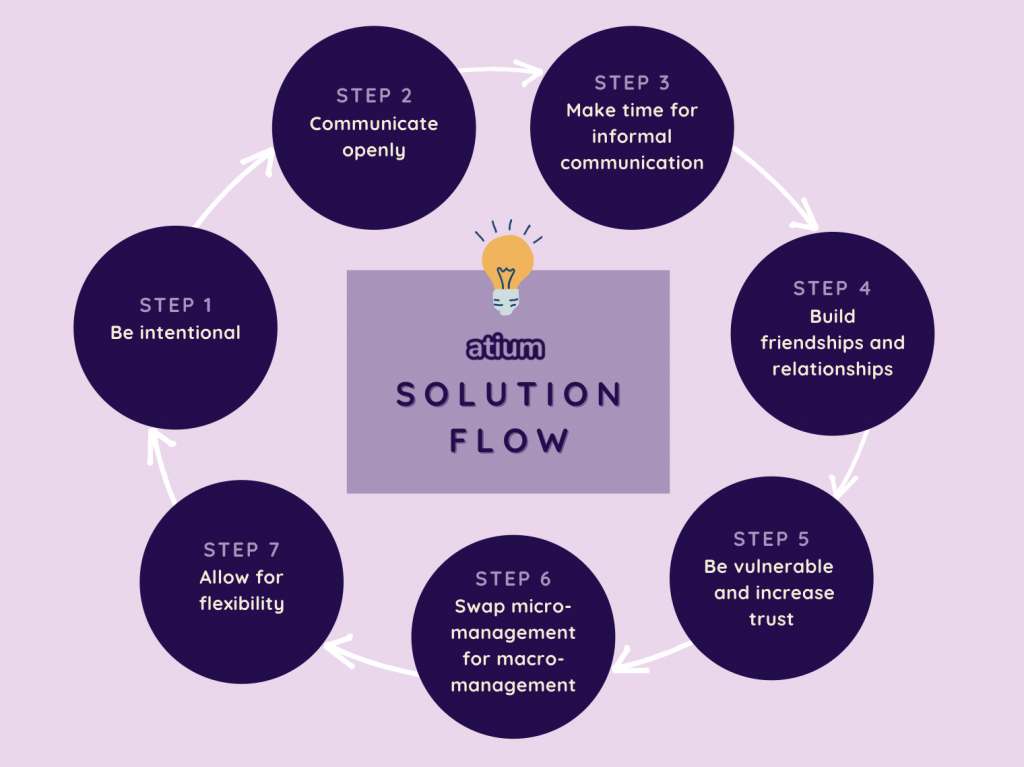This is a guest post by Dasha Antsipava, responsible for Communications and Research at Atium.
Social interaction is often cited to be one of the biggest challenges of remote work, and this challenge has become even more pronounced during the pandemic as newly remote teams have struggled to adjust to the new reality.
At Atium, our aim is to empower teams to work remotely effectively without hindering social interaction. For this reason, we have been investigating the causes behind these social interaction problems and how they can be solved. In this post, we combine findings from academic research and anecdotal evidence from the best remote companies to summarise the problems associated with a lack social connection in remote teams, and offer solutions to these issues.
The biggest social interaction challenges of remote work
We identified the following factors as the most cited social connection challenges in research on remote team working. They are grouped into four themes.
Challenge 1: Social isolation

Loneliness and social isolation are some of the biggest challenges facing remote workers today. The reason for this is that people are missing the social interaction element that they experience at the office, when working from home.
This is a problem not only for the emotional wellbeing of a remote workforce, but also for the organisation itself – remote workers feel more isolated when working from home, and loneliness has been linked to lower employee performance. Increasing isolation also leads to an employee experiencing a lower sense of belonging to the company, which leads to lower employee retention as it raises intentions to leave.
Challenge 2: Lack of collaborative communication

Collaborative communication also continues to be a challenge for remote teams. This is an especially important challenge for teams that are semi-remote, argues a report produced by Buffer and AngelList, since most tools designed for remote work are designed for fully remote teams.
Another issue for collaborative communication is that employees treat virtual meetings as an opportunity to engage in multi-tasking. This is a problem because employees fail to pay attention, which leads us on to the next challenge.
Challenge 3: Lack of access to information

This challenge emerges directly as a result of working alone and away from other colleagues. Extra resources such as time and effort may be required to find out information from colleagues that you may need to complete your tasks. On the flipside, when working alone it may be easy to forget to tell your colleagues about important information that has come into your possession, according to Zapier. This can lead to problems in interpersonal communication.
Problems can also arise as a result of the lack of social cues afforded by face-to-face interaction. As a result, there is a lack of ‘mutual knowledge’, which under normal circumstances allows you to assess the situation appropriately. For example, if your colleague is having a bad day and is being snappy, you would be less permissive of this behaviour in a virtual setting due to a lack of mutual knowledge that your colleague is indeed very stressed that day.
Challenge 4: Micromanagement

Due to a lack of face-to-face supervision, managers become concerned that employees are not working hard enough. As a result, managers begin micromanaging their employees.
In fact, micromanagement has been shown to be counterproductive. Employees begin overworking, which must have a negative impact on their mental and physical health. At the same time, it leads employees to believe that managers are being unsupportive and are not helping them complete their work.
Solving remote work social interaction challenges

Now that we have identified the biggest social interaction challenges affecting remote teams, we next turn to solutions to these problems.
Solution 1: It’s all about intentions

Empirical research shows that you have to be intentional in building social connection. Leading fully remote organisations like Gitlab, also advocate intention in designing and engaging in informal communication.
This doesn’t mean organising ad-hoc Friday drinks on Zoom, or asking your colleague “How are you?” without real feeling. What this means in practice is that you must dedicate time to design and take part in activities that foster the qualities that you want to develop in your team. This also means that taking part in these activities must become a regular occurrence – a ritual.
How about scheduling daily check-ins with your team to see how they are getting on with their work, how they are doing emotionally, or just to have a chat about things unrelated to work?
Atium can help your team be intentional about social interaction by helping you to stay on top of integrating informal interaction moments into your work schedule. The Atium Slack app let’s you schedule ritual social moments according to your needs for mini Energizers before meeting, short Ice-breakers to welcome a new colleague, or longer Social hours to really bond with your team. Our Slack helper, Athena, will send you a reminder before the meeting with a link to an activity tailored to your needs.
Solution 2: Open communication

Open communication is the key to having a successful remote team. According to Zapier, the reason open communication is so important is because communication leads to trust. And this was overwhelmingly the opinion of the majority of the reports and whitepapers that we consulted.
Empirical research has shown that a lack of communication results in a decrease in trust. And this creates a vicious cycle. Managers don’t share crucial information with their employees because they don’t trust them, which leads to a decline in communication, which in turn lowers trust.
Lastly, a lack of open communication means that managers are unaware that their employees are working hard, again leading to a lack of trust, micromanagement by managers, and overworking by employees.
Open communication. Great. But what does that mean?
It means clearly communicating work expectations, objectives, and deadlines to the employees. This gives the employees accountability and allows them to demonstrate to their managers that they are trustworthy by completing work within deadlines. How they complete their projects should be up to them: allow employees flexibility to manage their own time.
It also means that relevant information must be conveyed to all concerning employees, so that everyone stays updated on what’s going on. This can be as simple as sharing the information in a public or team Slack or Microsoft channels, or Twist threads.
Make sure to use video in meetings to make everyone feel like they are in the same space. Pay attention to hints about the other person’s mood, as they can be a clear signal that a person is not reaching their emotional ‘jobs to be done’. Also, it may be difficult for people to express their feelings on camera or over chat. Likewise, it’s difficult to ‘read the room’ if you’re not in the same physical space, so take extra care to see how your colleague is doing.
A useful tool used by GitLab is emojis to convey emotions and supplement the nuances which are present in in-person interactions but absent in virtual communication. They say it helps to enhance human connection, empathy and relationships.
Solution 3: Informal communication

In addition to open communication, engaging in informal communication is equally important.
For one thing, it helps friendships to develop between employees (keep reading to find out why this is important in the next solution). Informal communication is also essential to allow employees to connect with each other personally and, according to Toptal, reduce miscommunication, providing an open avenue for the development of trust. More importantly, research has demonstrated that giving employee benefits that underline the social-side of the organisation-employee relationship have beneficial outcomes on efficiency, loyalty and worker satisfaction.
To implement this solution, it is vital to build social (ubiquitous ‘water cooler chat’) moments into the working day. In fact, it has been shown that to have a good day, humans require 6 hours of social time per day. One way to integrate social moments into your day is to dedicate some time in each meeting to discussions about non-work related topics, or organising virtual office and pizza parties.
Solution 4: Build relationships – and friendships

Did you know that employees who have work friends enjoy their job more, have higher work performance and are more invested in your company? Even better though is having a work *best* friend: employees with work best friends are more committed to their jobs, are better at connecting with clients, are happier, and have a lower likelihood of being injured while on the job.
While it may worry some managers that employees may spend valuable time engaged in non-work related conversations instead of working, research shows that they shouldn’t be! Researchers at the MIT have demonstrated that, actually, idle conversations between employees lead to higher productivity.
And it’s not just about having friends – it’s about being friendly. Academic research shows that people behave more prosocially towards their team members when they expect this behaviour to be reciprocated.
So how can employees build relationships in fully remote settings? Toptal admit that this is easier to accomplish in office environments with physical spaces for people to interact and build culture naturally. But it is still possible in remote settings – you just have to be more intentional about it.
One way to do this is, again, to dedicate time to virtual social interaction. Another important thing is for managers to let their employees know that they are there for them, whenever they need, to discuss problems they may be facing work, acknowledge stress, and offer emotional support. This is especially important now, when many teams became remote overnight and many employees are unsure how to handle that. Finally, it’s also important to celebrate the good things – acknowledge an employee’s outstanding performance and celebrate team wins. This will demonstrate to employees that their hard work is being seen, acknowledged and rewarded, and it helps to enhance team relationships.
Atium activities are specifically designed to help your team develop strong social connections. Build relationships and friendships with your colleagues by finding out more about them in Fact Bucket, what they looked like as a kid in Babyface, or what their favourite workout song is in My Anthem. Increase vulnerability and build trust by being silly together in The Great Mimic an Animal Game. Or simply have fun together and enhance your social connection by competing against each other in GIF Tournament.
Solution 5: Vulnerability, Trust and Psychological Safety

With deeper relationships and friendships comes vulnerability – a word that probably frightens many of us. People generally don’t like to feel vulnerable.
But vulnerability is an important prerequisite for building trust in your team. And trust is an essential component of successful remote teams. As we have seen earlier, a lack of trust from leaders results in micromanagement and overworking, while lack of trust from employees leads to feelings of underappreciation and lack of motivation to do the job well. So in a successful remote team, trust is a two-way street: managers must trust their employees, and employees must trust the managers.
Many of us think that trust precedes vulnerability, but this is not the case. Research shows that it’s actually the opposite – a person must show their own vulnerability before they can trust another person. An experiment showed that people who were put in vulnerable situations were more likely to show cooperation. This has to do with the fact that your brain releases oxytocin when you trust someone. On the flipside, those who were made to feel invulnerable actually displayed a decrease in cooperative behaviour.
Vulnerability is not just about the person being vulnerable but also about the person on the receiving end. How you react to someone’s vulnerability dictates the kind of relationship you are going to have: displaying your own weaknesses in return establishes a ‘vulnerability loop’ which leads to trust and cooperation.
Vulnerability leads to trust and trust leads to psychological safety: “the belief that you won’t be punished when you make a mistake“. Google found that psychological safety is key to having a successful team. The reason for this is that psychological safety has been associated with positive business behaviours such as taking mild risks, being creative and speaking what’s on your mind.
Solution 6: Swap micromanagement for macromanagement

As we have already seen numerous times, micromanagement is counterproductive and demotivating, resulting from a lack of trust and feeding its own self-perpetuating cycle:

Now that we have built trust within the team, managers need to loosen the reigns. The first important step to doing so, as mentioned earlier, is to clearly and openly convey the expectations, objectives, and individual deadlines to each employee. That way they know what is expected of them, by which time, and they can get on with achieving it.
The second step is to understand your employees’ ‘jobs to be done’, and try to help them achieve those through their work. Since ‘jobs to be done’ are how employees evaluate the quality of their job experience, employees will be more fulfilled in their work, happier with their job, and as a consequence less likely to quit. This leads to onto our final point.
Solution 7: Flexibility

Flexibility was found by Buffer and AngelList to be one of the biggest perks of remote work. It’s time to give the people what they want! This is inevitably linked to (and should be a direct outcome of) more trust and less micromanagement. The more trust a manager has in their team, the less likely they are to micromanage. And Zapier believe that less micromanagement should mean more flexibility for employees to complete their work and reach the predetermined deadlines in their own time.
It’s time to change the outdated assumption that more time spent at the working desk equals higher productivity. Employees may work more efficiently at different times of the day and according to different schedules than the cliche ‘9-to-5’. Change how you measure KPIs: instead of focusing on ‘time-in-seat’ — how about focusing on ‘goal accomplishment’ instead?
In the end…
The biggest challenges facing remote workforces today relate to poor social interaction. Specifically, social isolation, collaboration, lack of access to information, and micromanagement, are some of the biggest problems facing teams today.
In order to overcome these problems you must be intentional about social interaction. It is important to engage in open communication with your colleagues to make sure everyone is on the same page about what’s going on. That way, no one will feel left out and trust begins to flourish.
At the same time, building stronger connections, and even friendships, is important for a happy and motivated remote team. Informal connection is essential for that. You must schedule social moments with your teams in order to build stronger bonds.
Once you are comfortable, it is time to show some vulnerability. And you must be open to receiving it. Vulnerability will help your team establish trust, which means less micromanagement and employees that feel supported in their day-to-day tasks. Finally, more trust and less micromanagement means more flexibility for employees to do their job, fulfil their ‘jobs to be done’, increase their welfare, and be more productive. A win-win for everyone ?
About the author
Dasha Antsipava is responsible for Communications and Research at Atium. Dasha is Atium’s first employee, working closely with the co-founders at building the business. Dasha’s focus at Atium is on conducting research into the needs of remote teams and solutions to support them, while also finishing her Research Master’s in Communication Science at the University of Amsterdam.
Atium is startup helping leaders create effective and engaging remote cultures. Atium was founded in March 2020, by Guido, Giannis, and Mario, and was the winner of Running Remote’s ‘Hottest Remote Work Startup’ of 2020 award.





